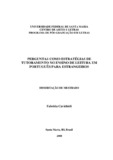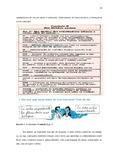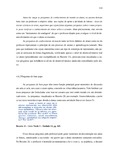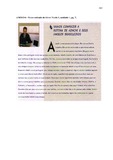| dc.creator | Braida, Fabrícia Cavichioli | |
| dc.date.accessioned | 2008-04-22 | |
| dc.date.available | 2008-04-22 | |
| dc.date.issued | 2008-01-25 | |
| dc.identifier.citation | BRAIDA, Fabrícia Cavichioli. Questions as tutorial strategies in the teaching of reading in portuguese for foreigners. 2008. 182 f. Dissertação (Mestrado em Letras) - Universidade Federal de Santa Maria, Santa Maria, 2008. | por |
| dc.identifier.uri | http://repositorio.ufsm.br/handle/1/9777 | |
| dc.description.abstract | In the last decades language specialists and researchers have dedicated special attention to the teaching of languages in general. Many of these researches have directed their interests to the analysis of textbooks, aiming as main purpose to point out improvements and/or possible modifications on them in order that they could contribute as in the structural quality of these textbooks as in their use in the classroom. Thus, trying to expand still more this field, this research aims at analyzing the textbooks used in the teaching of Portuguese as a Foreign Language. That s why, this study is guided by two general objectives: (1) investigating to what extend the questions proposed by the authors in the textbooks reading sections help both teacher and student to cross the Zone of Proximal Development; (2) comparing the modelpattern
of didactic material as well as the reading sections analyzed in order to verify in which materials the teacher notice rates of improving toward what he considers appropriate to the teaching of reading. For integrating the corpus of such investigation, three student s textbooks followed by the teacher s book were selected, adding a total of six books. In these books, questions elaborated by the authors in the reading section were analyzed. For so, as the referential methodology the second generation of the Activity Theory, proposed by Leontiev (1978), was considered relevant, mainly the three hierarchical levels of activity- activityactions
and operations. Then, based on the data analyses, it was possible to conclude that the questions proposed by the authors are not structurally connected with the aim of propitiating, between teacher and student, the work in Zone of Proximal Development (ZPD). Besides that, the textbooks present an inconsistent connection, some typologies are structured in a traditional way, becoming their main goal to evaluate the student in relation to the contents offered by the book and, mainly, leading him to reproduce ready knowledge. However, as opposed to the kind of questions found out in this books (for both student and teacher), there are questions elaborated in the model-pattern of the didactic materials, which are understood as a kind of tutorial strategy. Thus, they are defined due to the aid that they provide for teacher and student in order that they can work in ZPD. The growing connection of such questions enable the student of working firstly in the real development line to gradually, tutored by the teacher, advance toward the potential development line. When the teacher tutors the learner he helps this learner to consolidate more effectively the knowledge that belongs to potential development line. That is, the aid dedicated via these questions helps the foreigner learner to construct the knowledge that was not formed yet, enabling him to advance toward superior levels of development. | eng |
| dc.description.sponsorship | Coordenação de Aperfeiçoamento de Pessoal de Nível Superior | |
| dc.format | application/pdf | por |
| dc.language | por | por |
| dc.publisher | Universidade Federal de Santa Maria | por |
| dc.rights | Acesso Aberto | por |
| dc.subject | Perguntas | por |
| dc.subject | Ensino | por |
| dc.subject | Leitura | por |
| dc.subject | Português para estrangeiros | por |
| dc.subject | Questions | eng |
| dc.subject | Teaching | eng |
| dc.subject | Reading | eng |
| dc.subject | Portuguese for foreigners | eng |
| dc.title | Perguntas como estratégias de tutoramento no
ensino de leitura em português para estrangeiros | por |
| dc.title.alternative | Questions as tutorial strategies in the teaching of
reading in portuguese for foreigners | eng |
| dc.type | Dissertação | por |
| dc.description.resumo | Nas últimas décadas, estudiosos e pesquisadores da linguagem têm dedicado especial atenção ao ensino de línguas em geral. Muitas dessas pesquisas têm direcionado seus interesses para a análise de livros didáticos, visando como propósito principal apontar melhorias e/ou possíveis
modificações, a fim de que essas contribuam tanto na qualidade estrutural de tais livros quanto no uso deles na prática em sala de aula. Assim, na tentativa de expandir ainda mais esse campo, esta pesquisa se propôs a analisar os livros didáticos destinados ao ensino de português para estrangeiros. Norteiam, portanto, este estudo dois objetivos gerais, a saber: (1) investigar em que medida as perguntas propostas nas seções de leitura por parte dos autores
dos livros didáticos assistem professor e aluno na travessia da Zona de Desenvolvimento Proximal; (2) comparar o modelo-padrão de material didático e as seções de leitura analisadas
a fim de verificar em quais desses materiais o professor percebe índices de melhora em direção ao que considera desejável para o ensino de leitura. Foram selecionados, para integrar o corpus desta investigação, três livros didáticos do aluno, acompanhados respectivamente do livro didático do professor, somando um total de seis livros. Neles foram analisadas as perguntas elaboradas pelos autores nas seções de leitura. Para tanto, foi considerada relevante, como metodologia referencial, a segunda geração da Teoria da Atividade proposta por Leontiev (1978), mais especificamente, os três níveis hierárquicos da atividade atividade ações e operações. Assim, com base na análise dos dados, foi possível concluir que as perguntas propostas pelos autores não estão encadeadas estruturalmente com o intuito de propiciar o trabalho em Zona de Desenvolvimento Proximal (ZDP) entre professor e aluno. Isso porque, além de apresentarem um encadeamento inconsistente, algumas tipologias estruturam-se de forma tradicional, tornando-se meta consagrada destas avaliar o aluno em relação aos conteúdos oferecidos pelos livros didáticos e, sobretudo, induzi-lo a reproduzir conhecimentos prontos. No entanto, contrapõem-se aos tipos de perguntas encontradas nesses
livros (tanto do aluno como do professor), as perguntas elaboradas no modelo-padrão de material didático, no qual elas são entendidas como um tipo de estratégia de tutoramento. São definidas, assim, devido ao auxílio que prestam ao professor e ao aluno, a fim de que possam
trabalhar em ZDP. O encadeamento crescente dessas perguntas permite que o aluno trabalhe primeiramente na linha de desenvolvimento real para que, gradativamente, tutorado pelo professor, avance para a linha de desenvolvimento potencial. Tutorando o aprendiz, o professor ajuda-o a consolidar de forma mais efetiva os conhecimentos pertencentes à linha de desenvolvimento potencial. Ou seja, a assistência prestada por intermédio dessas perguntas
auxilia o aprendiz estrangeiro na formação de conhecimentos que ainda não estão formados, permitindo que ele avance para níveis superiores de desenvolvimento. | por |
| dc.contributor.advisor1 | Richter, Marcos Gustavo | |
| dc.contributor.advisor1Lattes | http://lattes.cnpq.br/1817640663872249 | por |
| dc.contributor.referee1 | Paz, Dioni Maria dos Santos | |
| dc.contributor.referee1Lattes | http://lattes.cnpq.br/6600424274405570 | por |
| dc.contributor.referee2 | Corrêa, Marcia Cristina | |
| dc.contributor.referee2Lattes | http://lattes.cnpq.br/4758168670271026 | por |
| dc.creator.Lattes | http://lattes.cnpq.br/8785120577618177 | por |
| dc.publisher.country | BR | por |
| dc.publisher.department | Letras | por |
| dc.publisher.initials | UFSM | por |
| dc.publisher.program | Programa de Pós-Graduação em Letras | por |
| dc.subject.cnpq | CNPQ::LINGUISTICA, LETRAS E ARTES::LETRAS | por |





